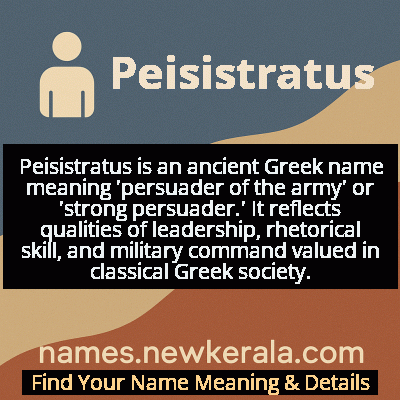Peisistratus Name Meaning & Details
Origin, Popularity, Numerology Analysis & Name Meaning of Peisistratus
Discover the origin, meaning, and cultural significance of the name PEISISTRATUS. Delve into its historical roots and explore the lasting impact it has had on communities and traditions.
Name
Peisistratus
Gender
Male
Origin
Greek
Lucky Number
5
Meaning of the Name - Peisistratus
Peisistratus is an ancient Greek name meaning 'persuader of the army' or 'strong persuader.' It reflects qualities of leadership, rhetorical skill, and military command valued in classical Greek society.
Peisistratus - Complete Numerology Analysis
Your Numerology Number
Based on Pythagorean Numerology System
Ruling Planet
Mercury
Positive Nature
Adventurous, dynamic, curious, and social.
Negative Traits
Restless, impatient, inconsistent, prone to indulgence.
Lucky Colours
Green, white.
Lucky Days
Wednesday.
Lucky Stones
Emerald.
Harmony Numbers
1, 3, 9.
Best Suited Professions
Sales, marketing, travel, entertainment.
What People Like About You
Versatility, charisma, adventurous spirit.
Famous People Named Peisistratus
Peisistratus of Pylos
Mythological Figure
Son of King Nestor in Homer's epics, represented ideal Greek youth
Peisistratus of Athens
Tyrant of Athens
Founded Panathenaic Festival and promoted Athenian culture
Peisistratus the Younger
Athenian Statesman
Continued political legacy as archon of Athens
Name Variations & International Equivalents
Click on blue names to explore their detailed meanings. Gray names with will be available soon.
Cultural & Historical Significance
Extended Personality Analysis
The name Peisistratus evokes a personality characterized by strategic intelligence, persuasive communication, and natural leadership. Individuals with this name are typically perceived as politically savvy, possessing the ability to read complex social dynamics and navigate power structures effectively. They combine traditional values with progressive thinking, often serving as bridges between established customs and necessary change. The mythological association suggests someone who is respectful of elders and traditions yet confident in their own capabilities—a balanced individual who understands both the importance of heritage and the necessity of growth. Historically, the name implies ambition tempered with cultural sophistication, suggesting a person who seeks influence not merely for power's sake but to implement meaningful, lasting improvements. These individuals often exhibit strong diplomatic skills, able to persuade others through logical argument and emotional intelligence rather than brute force. The personality profile suggests someone who is both a guardian of tradition and an agent of progress, capable of honoring the past while building for the future.
Modern Usage & Popularity
In contemporary naming practices, Peisistratus has virtually disappeared as a given name and exists primarily as a historical and academic reference. The name's association with ancient tyranny and its complex, multi-syllabic structure make it impractical for modern use outside specialized contexts. It occasionally appears in classical studies programs, historical novels, or among families with deep connections to Greek heritage, but even in Greece itself, the name is considered archaic and is rarely bestowed upon children. The decline in usage reflects broader trends away from overtly classical or politically charged names in favor of more accessible, internationally recognizable options. When encountered today, the name typically serves as an academic marker or cultural reference point rather than a functional personal identifier, preserving its historical significance while losing its practical application in modern naming conventions.
Symbolic & Spiritual Meanings
Symbolically, Peisistratus represents the intersection of power and culture, embodying the Greek ideal of arete (excellence) through both political and intellectual achievement. The name signifies persuasive strength—the ability to lead armies through rhetoric as well as strategy—and carries connotations of cultural patronage and preservation. It symbolizes the transformative potential of leadership when coupled with artistic and intellectual appreciation, as demonstrated by the historical Peisistratus's contributions to Athenian cultural life. The name also represents the tension between different forms of governance, serving as a reminder that progress often emerges from complex, sometimes controversial, leadership models. In a broader sense, Peisistratus symbolizes the enduring Greek values of wisdom, persuasion, and cultural sophistication, representing the ideal that true power involves not just military or political might but also the advancement and preservation of civilization itself.

